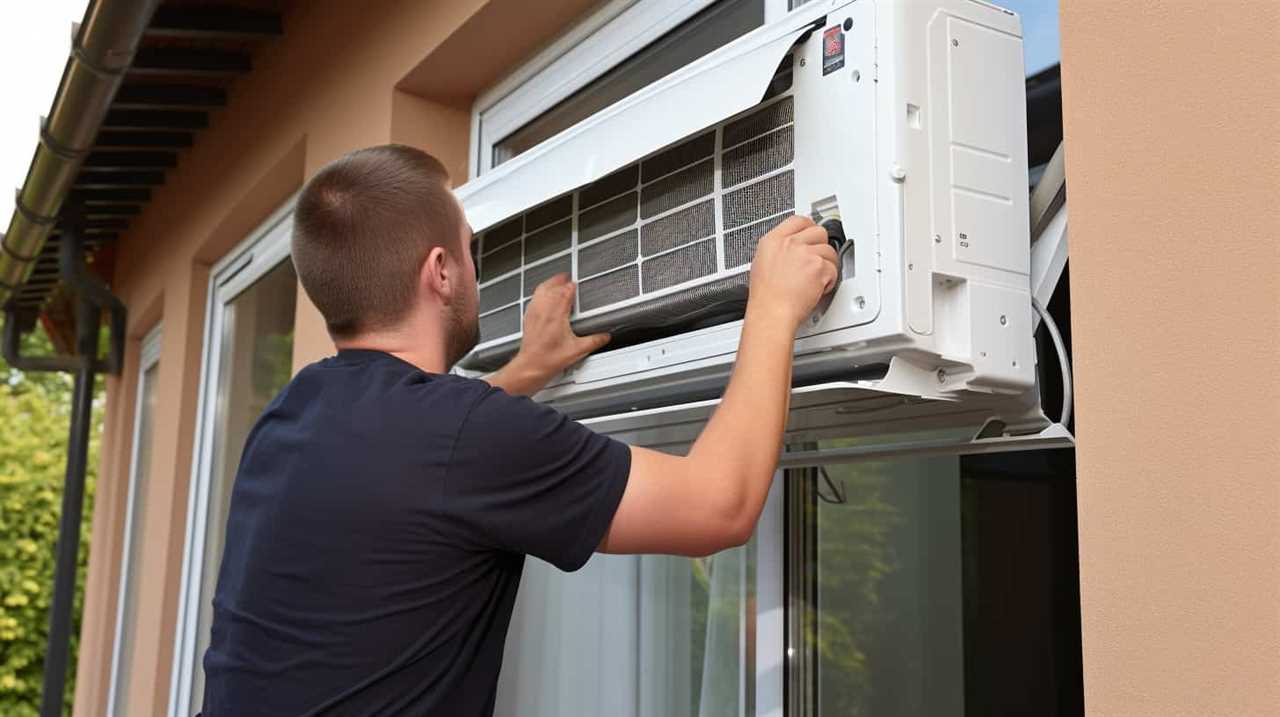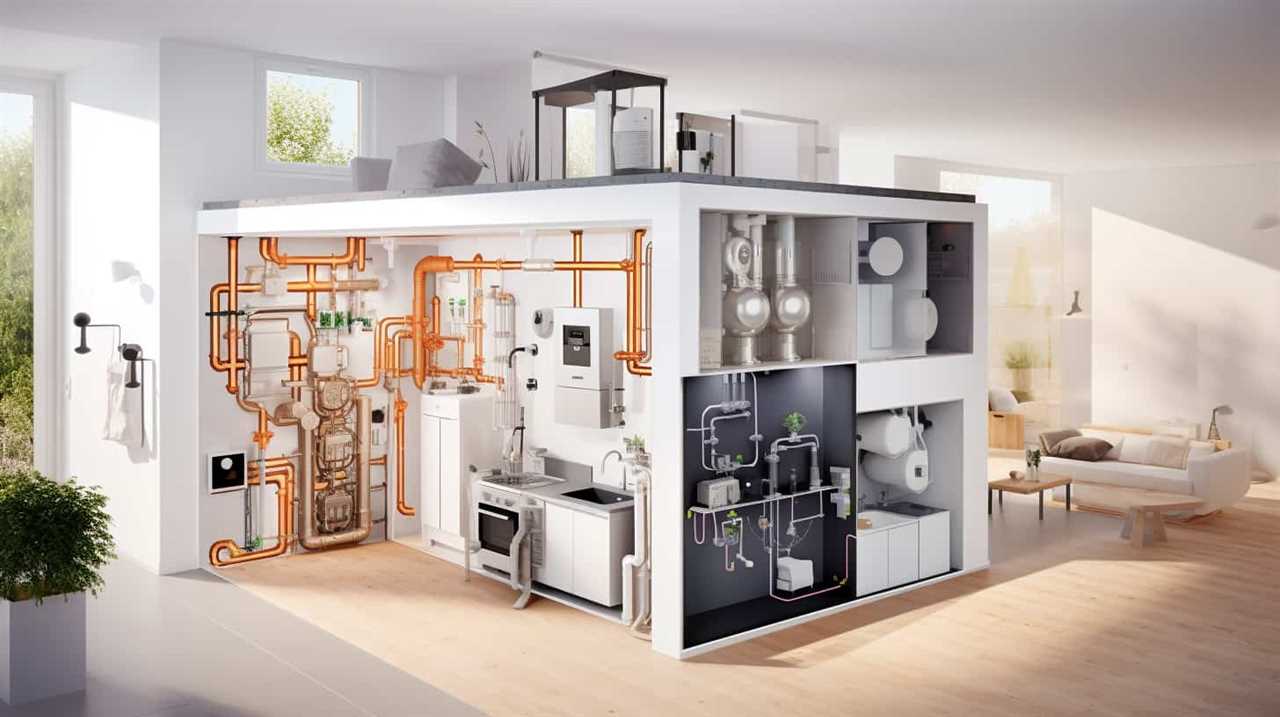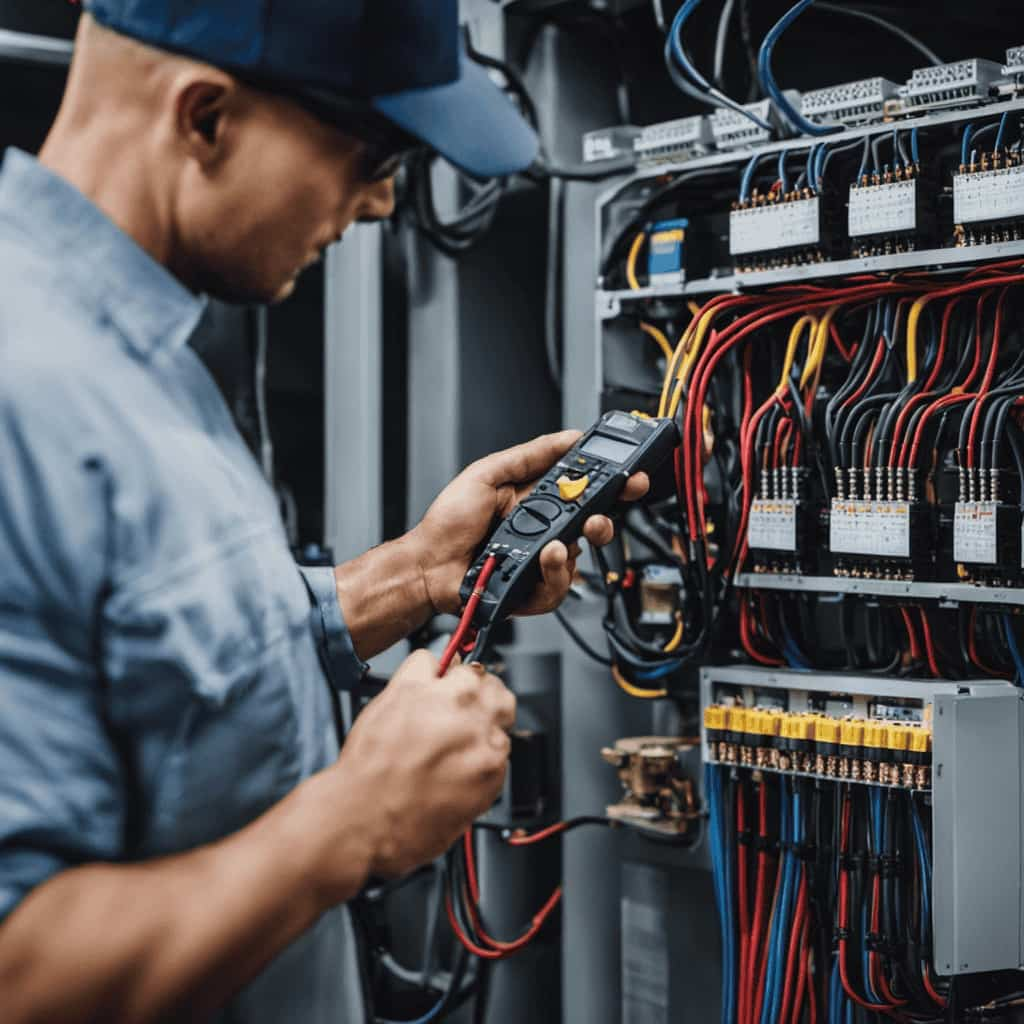We have all been informed about the advantages of heat pumps in cutting energy costs and lowering utility bills.
But did you know that choosing the right heat pump model can make a significant difference in your energy efficiency?
In this guide, we’ll explore the key factors to consider when evaluating heat pump models, compare their energy efficiency performance, and provide tips for selecting the most energy efficient option.
Get ready to make an informed decision and maximize your energy savings!

Key Takeaways
- Energy efficiency ratings, such as SEER and HSPF, provide insights into energy consumption and potential savings.
- Proper sizing of a heat pump is crucial for energy efficiency and optimal performance.
- Comparing SEER and EER ratings can help determine the energy efficiency performance of different heat pump models.
- Regular maintenance is essential for ensuring the energy efficiency and longevity of a heat pump.
Understanding Energy Efficiency Ratings
When evaluating heat pump models, we need to understand energy efficiency ratings. These ratings provide valuable insights into the energy consumption and potential energy savings of a particular model.
Energy efficiency ratings are typically represented by a numerical value known as the Seasonal Energy Efficiency Ratio (SEER) or the Heating Seasonal Performance Factor (HSPF). The SEER rating measures the cooling efficiency of the heat pump, while the HSPF rating measures its heating efficiency.
Higher SEER and HSPF ratings indicate greater energy efficiency, resulting in lower energy consumption and potential savings on utility bills. By understanding these ratings, consumers can make informed decisions when selecting a heat pump that aligns with their energy-saving goals.
It’s essential to consider the long-term benefits of energy efficiency, as it not only reduces environmental impact but also contributes to cost savings in the household budget.

Key Factors to Consider When Evaluating Heat Pump Models
To evaluate heat pump models, we must consider key factors that directly impact their performance and energy efficiency. When comparing different models, here are the top five factors to keep in mind:
-
Energy Savings: Look for heat pumps that have high Energy Efficiency Ratio (EER) and Seasonal Energy Efficiency Ratio (SEER) ratings. These indicate how efficiently the unit can cool and heat your home, resulting in lower energy consumption and cost savings.
-
Environmental Impact: Consider heat pumps that use eco-friendly refrigerants, such as R-410A, which have a lower impact on the ozone layer and contribute less to global warming.
-
Size and Capacity: Ensure that the heat pump is properly sized for your home to optimize its performance and energy efficiency.

-
Noise Level: Look for models with low noise ratings for a quieter and more comfortable living environment.
-
Warranty and Maintenance: Consider the warranty and maintenance requirements to ensure long-term reliability and cost-effectiveness.
By considering these factors, you can make an informed decision that maximizes energy savings and minimizes the environmental impact of your heat pump.
In the next section, we’ll explore how to compare the energy efficiency performance of different heat pump models.

Comparing Energy Efficiency Performance of Different Heat Pump Models
We can compare the energy efficiency performance of different heat pump models by analyzing their Seasonal Energy Efficiency Ratio (SEER) and Energy Efficiency Ratio (EER) ratings. These ratings provide valuable information about the overall performance and efficiency of the heat pump.
The SEER rating calculates the cooling efficiency of the heat pump over an entire cooling season, while the EER rating measures its efficiency at a specific outdoor temperature. By evaluating these ratings, we can determine which heat pump model is more efficient and better suited for our specific needs.
It’s important to note that a higher SEER or EER rating indicates a more energy-efficient heat pump, resulting in lower energy consumption and cost savings. When comparing models, it’s crucial to consider these ratings as they directly affect the performance and efficiency of the heat pump.
How to Interpret Energy Efficiency Labels on Heat Pump Models
Our guide will outline how we can interpret energy efficiency labels on heat pump models to make informed decisions. Interpreting labels is crucial in understanding the energy efficiency indicators of a heat pump model. Here are five key points to consider:

-
Energy Efficiency Ratio (EER): This indicates the cooling efficiency of the heat pump. A higher EER value means better energy performance.
-
Seasonal Energy Efficiency Ratio (SEER): SEER measures the cooling efficiency over an entire cooling season. A higher SEER rating signifies greater energy efficiency.
-
Heating Seasonal Performance Factor (HSPF): HSPF measures the heat pump’s heating efficiency. A higher HSPF rating indicates better efficiency during winter months.
-
Coefficient of Performance (COP): COP measures the ratio of heat output to the amount of electricity consumed. A higher COP value signifies increased efficiency.

-
ENERGY STAR® Certification: Look for the ENERGY STAR label, as it indicates that the heat pump meets stringent energy efficiency standards.
Understanding these energy efficiency indicators will help you make an informed choice when selecting the most energy efficient heat pump model.
Tips for Selecting the Most Energy Efficient Heat Pump Model
First, consider the size and capacity of the heat pump model. Choosing the right size heat pump is crucial for energy efficiency and optimal performance. A heat pump that is too small will struggle to heat or cool your space efficiently, while a heat pump that is too large will cycle on and off frequently, wasting energy. To determine the appropriate size, you can consult a professional or use online calculators that take into account factors such as the size of your space, insulation levels, and climate.
Regular maintenance is also essential for ensuring the energy efficiency of your heat pump. By scheduling regular inspections and cleanings, you can keep your heat pump running smoothly and efficiently. Maintenance tasks may include cleaning or replacing filters, checking refrigerant levels, and inspecting the coils and fans for any damage or blockages. Additionally, regular maintenance helps identify any potential issues early on, preventing costly repairs and ensuring the longevity of your heat pump.

To help you make an informed decision when selecting an energy-efficient heat pump model, let’s take a look at the following table comparing different models:
| Heat Pump Model | Energy Efficiency Rating |
|---|---|
| Model A | A++ |
| Model B | A+ |
| Model C | A |
| Model D | B |
Frequently Asked Questions
Are There Any Government Incentives or Rebates Available for Purchasing Energy Efficient Heat Pump Models?
Yes, there are government incentives and rebates available for purchasing energy efficient heat pump models. These incentives and rebates aim to promote energy efficiency and provide financial support to individuals and businesses.
What Is the Expected Lifespan of a Heat Pump Model With High Energy Efficiency Ratings?
Based on our research, heat pump models with high energy efficiency ratings have an expected lifespan comparable to a well-maintained car, typically around 15-20 years.
Can I Install a Heat Pump Model in My Existing HVAC System or Does It Require Additional Modifications?
Yes, you can install a heat pump model in your existing HVAC system, but it may require additional modifications. The installation requirements will depend on the specific heat pump model and your current HVAC setup.

Do Heat Pump Models With Higher Energy Efficiency Ratings Require More Frequent Maintenance or Servicing?
Higher energy efficiency rated heat pump models do not necessarily require more frequent maintenance or servicing. However, it is important to regularly maintain all heat pump models to ensure optimal performance and to potentially qualify for energy efficiency rebates.
Are There Any Specific Installation Requirements or Considerations for Heat Pump Models in Different Climate Regions?
Installation requirements and considerations for different climate regions should be taken into account when evaluating heat pump models. It is important to understand how the specific climate conditions can impact the performance and efficiency of the heat pump system.
Conclusion
In conclusion, when evaluating heat pump models for energy efficiency, it’s crucial to consider key factors such as the Seasonal Energy Efficiency Ratio (SEER) and the Heating Seasonal Performance Factor (HSPF). By comparing these ratings, consumers can make informed decisions and select the most energy efficient heat pump model for their needs.
Interestingly, studies have shown that heat pumps with higher SEER and HSPF ratings can reduce energy consumption by up to 40%. This significant reduction in energy costs is achieved while maintaining optimal comfort levels in homes.










